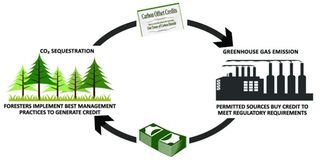NCMC: Carbon trading nothing new as it benefits 100 villages

What you need to know:
- According to NCMC here are three big projects going on in the villages form 2007/08 with an implementation period of 30 years.
Dar es Salaam. Carbon trading is not an entirely new phenomenon, as a quarter of Tanzania’s forests had already been engaged in carbon trading projects between 2007 and 2023, according to the National Carbon Monitoring Centre (NCMC).
Hitherto, more than 100 villages in the country continue to benefit from the income generated every year from the business that involves producing clean air while absorbing polluted air in the atmosphere, said the chief executive officer of the NCMC, Prof Eliakimu Zahabu.
NCMC, which works under the Sokoine University of Agriculture (SUA), designs, manages the data, and coordinates national measurement, reporting, and verification (MRV) of forest processes.
Prof Zahabu said that investment in carbon trading works on 22 projects, investing in an average of 12 million out of the country’s 48.1 million hectares.
Prof Zahabu said that the centre seeks to analyse the total value of the invested projects to offset carbon emissions during the implementation period of the 30-year projects.
“Until June next year, we will have completed a report to find out the contribution of all the carbon trading projects throughout the country, including wildlife reserves. The results will determine our position globally,” he said in an interview.
According to the African Carbon Markets Initiatives (ACMI), the sale of one tonne of polluted air absorbed by clean air through such projects averages $10 in the market. The 2022 AMCI report estimates carbon production in Africa will be 1.5 billion metric tonnes per year by 2050, worth $120 billion annually and generating 110 million jobs.
Ongoing projects
According to NCMC, there are already three big projects going on in the villages from 2007 to 2008, with an implementation period of 30 years. There are already more than 26,000 villagers benefiting from Sh4.7 billion every year through the Makame Community Savings Association group. They are flung in Kiteto District, Manyara Region (Ngabolo Village, Ndedo, Makame, Katikati, and Irkiushiobor).
“We inked a 30-year contract with Tanzania Carbon in 2017. For the last three years, we have earned Sh3.7 billion,” said the project manager, Mr Supuk Olekao.
“The project has supported health services, water supply, and financing education from certificate level to university,” he added.
Tanzania National Parks (TANAPA) and Carbon Tanzania (CT) inked a Memorandum of Understanding (MoU) for carbon project across six national parks to cover a total area of 1.8 million hectares, making it the largest land-based carbon initiative in East Africa.
Some 34,242 residents in eight villages in Tanganyika District in Katavi Region have benefited from proceeds worth Sh4 billion since 2018 from carbon trading.
The project is run by the local council, the Tanzania Carbon Institute, in collaboration with the Unite for Health and a Better Environment project.
Its implementation is part of the execution of the United Nations Framework Convention on Climate Change (UNFCCC), the Kyoto Protocol of 1997, and the Paris Agreement of 2015, which influence the reduction of carbon emissions to below 1.5 degrees Celsius.
In order for the project initiators to trade, they have to engage consultants to verify the actual amount of carbon absorbed before being certified to meet international standards by accredited companies that include Verra, Gold Standard, Plan Vivo, and ISCC.
“The buyers are private companies that produce carbon, including airlines, mining, gas, oil, cement factories, coal, and electronic equipment manufacturers,” said the operations manager of the ADAP company that organises the carbon conferences, Mr Cosmas Tungaraza.
Carbon credit expert and head of operations unit at ADAP Company, Mr Yves Hausser, said, “Tanzania has great opportunities. The most basic thing is to invest in education, as many citizens fail to connect the benefits accrued.”
According to the 2022 Nation Guidelines for Carbon Trading, the applicant should submit the proposed project idea, submit the document, pay for registration, and prepare the project document to meet international standards approval.
Market demand
The Global Carbon Business Investment Report for 2023 under Trove Research shows that investment in projects between 2012 and 2022 reached $36 billion, while half of the investment was made in the last three years.



